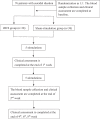Adjunctive duration-doubled transcranial direct current stimulation for the treatment of depressive patients with suicidal ideation: study protocol for a double-blind, randomized, sham-controlled trial
- PMID: 38167178
- PMCID: PMC10759703
- DOI: 10.1186/s13063-023-07858-0
Adjunctive duration-doubled transcranial direct current stimulation for the treatment of depressive patients with suicidal ideation: study protocol for a double-blind, randomized, sham-controlled trial
Abstract
Background: The problem of suicide has become increasingly common in individuals with major depressive disorder (MDD). Transcranial direct current stimulation (tDCS) is an effective treatment for MDD with 2 milliamperes (mA) for at least 30 min per day for 2 weeks. This study aims to investigate the efficacy of daily duration-doubled tDCS as an adjunctive intervention for rapidly reducing suicidal ideation and improving depression in MDD patients.
Methods: In this double-blind, randomized, sham-controlled study, 76 MDD patients with suicidal ideation are randomly assigned to either active (n=38) or sham (n=38) tDCS group. The anode and cathode are placed over the scalp areas corresponding to left and right dorsolateral prefrontal cortex (DLPFC), respectively, and each stimulation lasts for 60 min. The primary outcome is defined as change of Beck Scale for Suicide Ideation (BSI) after 5 and 10 sessions. The change of other clinical assessments, blood biomarkers related to suicidal ideation and depressive sumptoms are defined as secondary outcomes. Blood biomarkers related to suicidal ideation are collected at baseline and after 10 sessions.
Discussion: This study suggests the adjunctive duration-doubled tDCS might be a novel method to rapidly reduce suicidal ideation and improve depressive symptom. The variation of biomarkers could be potential predictive models of suicide risk.
Trial registration: The trial protocol is registered with ClinicalTrials.gov under protocol registration number NCT05555927. Registered on September 25, 2022.
Keywords: Major depressive disorder (MDD); Randomized controlled trial (RCT); Suicidal ideation; Transcranial direct current stimulation (tDCS).
© 2023. The Author(s).
Conflict of interest statement
The authors declare that they have no competing interests.
Figures

Similar articles
-
Efficacy of adjunctive intensive transcranial direct current stimulation of different cortices in treatment-resistant depression: a study protocol for a randomized double-blinded sham-controlled trial.BMC Psychiatry. 2022 Dec 19;22(1):802. doi: 10.1186/s12888-022-04465-2. BMC Psychiatry. 2022. PMID: 36536362 Free PMC article.
-
Neuronavigation-Guided rTMS for the Treatment of Depressive Patients With Suicidal Ideation: A Double-Blind, Randomized, Sham-Controlled Trial.Clin Pharmacol Ther. 2020 Oct;108(4):826-832. doi: 10.1002/cpt.1858. Epub 2020 Jun 4. Clin Pharmacol Ther. 2020. PMID: 32319673 Clinical Trial.
-
PsychotherapyPlus: augmentation of cognitive behavioral therapy (CBT) with prefrontal transcranial direct current stimulation (tDCS) in major depressive disorder-study design and methodology of a multicenter double-blind randomized placebo-controlled trial.Eur Arch Psychiatry Clin Neurosci. 2018 Dec;268(8):797-808. doi: 10.1007/s00406-017-0859-x. Epub 2017 Dec 6. Eur Arch Psychiatry Clin Neurosci. 2018. PMID: 29214483
-
TDCS at home for depressive disorders: an updated systematic review and lessons learned from a prematurely terminated randomized controlled pilot study.Eur Arch Psychiatry Clin Neurosci. 2023 Oct;273(7):1403-1420. doi: 10.1007/s00406-023-01620-y. Epub 2023 May 16. Eur Arch Psychiatry Clin Neurosci. 2023. PMID: 37191697 Free PMC article.
-
Is tDCS a potential first line treatment for major depression?Int Rev Psychiatry. 2021 May;33(3):250-265. doi: 10.1080/09540261.2021.1879030. Epub 2021 Mar 11. Int Rev Psychiatry. 2021. PMID: 33706656 Review.
References
-
- Lin YY, Chang CC, Huang CCY, Tzeng NS, Kao YC, Chang HA. Efficacy and neurophysiological predictors of treatment response of adjunct bifrontal transcranial direct current stimulation (tDCS) in treating unipolar and bipolar depression. J Affect Disord. 2021;280:295–304. doi: 10.1016/j.jad.2020.11.030. - DOI - PubMed
-
- Moffa AH, Martin D, Alonzo A, Bennabi D, Blumberger DM, Benseñor IM, et al. Efficacy and acceptability of transcranial direct current stimulation (tDCS) for major depressive disorder: an individual patient data meta-analysis. Prog Neuropsychopharmacol Biol Psychiatry. 2020;99:109836. doi: 10.1016/j.pnpbp.2019.109836. - DOI - PubMed
-
- Mutz J, Vipulananthan V, Carter B, Hurlemann R, Fu CHY, Young AH. Comparative efficacy and acceptability of non-surgical brain stimulation for the acute treatment of major depressive episodes in adults: systematic review and network meta-analysis. BMJ. 2019;364:l1079. doi: 10.1136/bmj.l1079. - DOI - PMC - PubMed
Publication types
MeSH terms
Substances
Associated data
LinkOut - more resources
Full Text Sources
Medical

